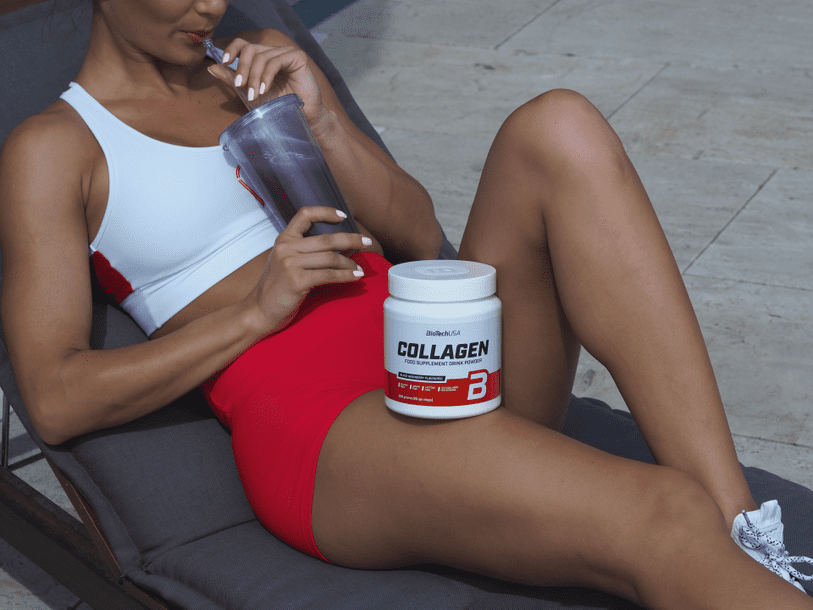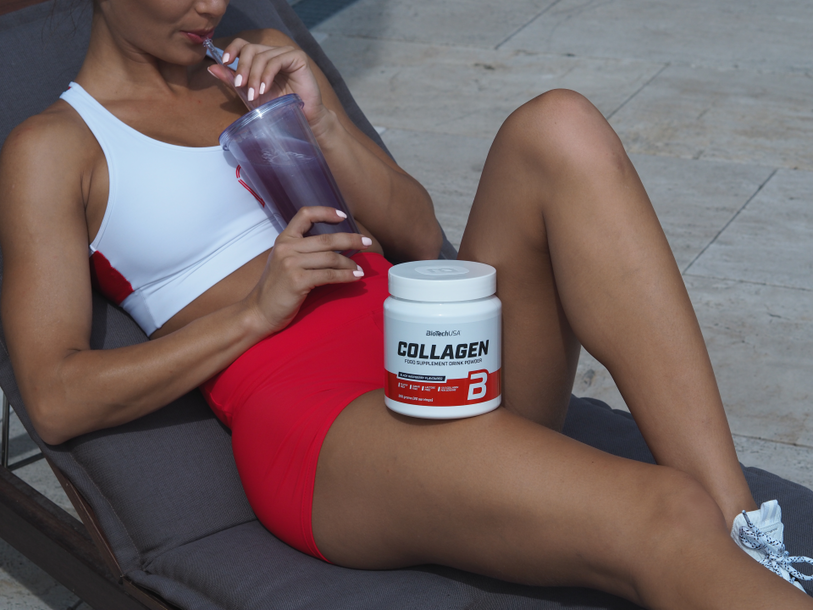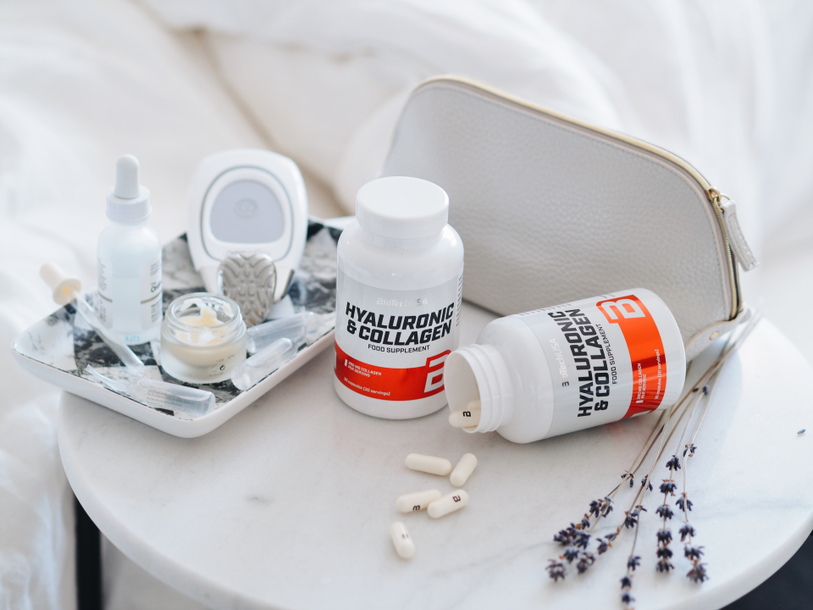
Everything you need to know about Hydrolyzed Collagen Peptides

Collagen is a family of fibrous proteins that are important for the health of your skin, hair, gut, joints and muscles. They are the most abundant proteins in our body and its supplementation is recommended in hydrolyzed from, as it will be easily dissolved in liquids, even water, meaning you can easily add it to your diet.
What’s the difference between collagen and collagen peptides?
If you’ve searched for collagen, most probably you’ve found options like collagen, collagen peptides, and even something else called gelatin. They are indeed pretty similar as the three of them are comprised of the same 18 types of amino acids and are an excellent source of essential amino acids.
Collagen
Collagen is the body’s most abundant building block. It is round 30% of the proteins in our bodies and it is a significantly important building block of your muscles, skin, tendons and ligaments. It acts as glue that holds important connective tissue together, including cartilage and bones, which is why it is an element often present in beauty and health products.
When we start getting older, it is normal for our bodies to produce less collagen and, as consequence, our connective tissue is affected: Skin gets wrinkled, joints hurt, bones are weaker, and muscle mass decreases.
Collagen peptides
When people take collagen from an external source and it is consumed in the form of food supplements, collagen peptides are present for easier absorption by the body. This happens because collagen would be too large and it would be destroyed and excreted before the body can use it for any of its benefits; collagen peptides are obtained through hydrolysis, meaning the molecular bond is broken down into small bioactive peptides that can easily be absorbed and used to renew tissue in your skin, bones and joints.
What does “hydrolyzed” mean?
|
Hydrolysis is a chemical reaction in which a molecule of water is used to rupture one or more chemical bonds of a particular substance; in the case of collagen, it results in what is commonly known as hydrolyzed collagen. |
As mentioned before, collagen must be broken down into collagen peptides for the body to be able to use it for its many benefits in the protection and nourishing of your connective tissue, meaning it needs to go through hydrolysis.
Here’s the industrial process for making hydrolyzed collagen:
-
Collect connective tissue from cows, chickens, or fish.
-
Break down connective tissue with water, enzymes, and acids (this is hydrolysis).
-
Obtain and filter resulting liquid.
-
Turn liquid into powder through precipitation.
It is also important to highlight that hydrolyzed collagen intake triggers the body’s natural production of collagen. In other words, collagen supplementation supports also the body’s natural collagen.
What are the benefits of hydrolyzed collagen?
Skin:
Everyone wants a firm, elastic and healthy looking skin; collagen plays a key role in all of them. When the collagen matrix in your skin starts to weaken because of aging, excessive sun exposure or smoking; wrinkles, lines and other skin problems appear.
After a day sunbathing or heavy sun exposure, the UV light damages your collagen matrix and you will need collagen for it your skin to recover. Hydrolyzed collagen will help your body to produce more collagen for it to be at the ideal levels needed for your skin’s recovery.
Joints:
Joint pain is no stranger for older people, but it is something that even younger people can suffer from, therefore is something everyone must be preventing.
Although research is still going, studies have already found that collagen supports in managing chronic joint pain, as collagen cares for connective tissue and stronger ligaments will help reduce pain levels.
Gut:
Just like collagen helps to repair and take care of muscle tissue, it supports taking care of the cells and line the interior of your gut. In addition, in cases of leaky gut collagen has yet to be proven as a healing alternative, but given the nature and benefits of collagen, it is believed to have a positive effect and enhance tissue recovery.
Muscles:
Collagen peptides are characterized by their high levels of specific amino acids glycine, hydroxyproline, proline, and alanine. Amino acids are the basic building blocks of the protein macronutrient and perform many functions in the body.
When it comes to muscle building, it is clear that after hard workouts, you need amino acids to regenerate, and thus develop your muscle fibers, as your muscle is made up of protein. Collagen and the amino acids present in it, support muscle recovery and help the proper functioning of muscle tissue.
Types of collagen peptides
1. Type I collagen:
Although collagen types I and III are often grouped together because they take up to 90% of the collagen present in our bodies and they both fullfill important functions, collagen type I is particularly important to provide structure for your bones, skin and connective tissue. It is made of densely packed fibers.
2. Type II collagen:
This type of collagen is mostly found in cartilage tissue and takes up to 50 of 60% of the proteins present in it. It is made of more loosely packed fibers so it supports elastic tissue and it has special importance when it comes to the wellbeing of the joints’ tissue.
3. Type III collagen:
This type of collagen can be found in the walls of our arteries and other hollow organs. It supports the structure of muscles, organs and arteries.

Collagen supplement from BioTechUSA
Collagen powder:
Dietary supplement drink powder with collagen, hyaluronic acid, vitamin C and vitamin E, with sweetener.
BioTechUSA’s Collagen practically provides hyaluronic acid and collagen at the same time. It contains added Vitamin C that contributes to the body’s own collagen production, which ultimately helps to preserve the health of your skin, blood vessels, bones, cartilage, teeth and gums. The Vitamin E content of the product plays an important role in the protection of cells against oxidative stress. This product is lactose, gluten and sugar free.
Per serving (15 g):
-
13 g collagen
-
90 mg hyaluronic acid
-
75 mg Vitamin C
-
2.7 mg Vitamin E
Hyaluronic & Collagen:
They could also be called compounds of freshness for your healthy, radiant skin. It is no coincidence that both have been used in the beauty industry for so long. And these are not artificial elements strange to the body, the human body itself produces these substances, which play an equally important physiological role in men and women. But their production slows down with age, so they may need to be replaced. BioTechUSA’s Hyaluronic & Collagen capsules now provide both at the same time, 100% gluten free.
Per serving (1 capsule):
-
60 mg hyaluronic acid
-
280 mg collagen